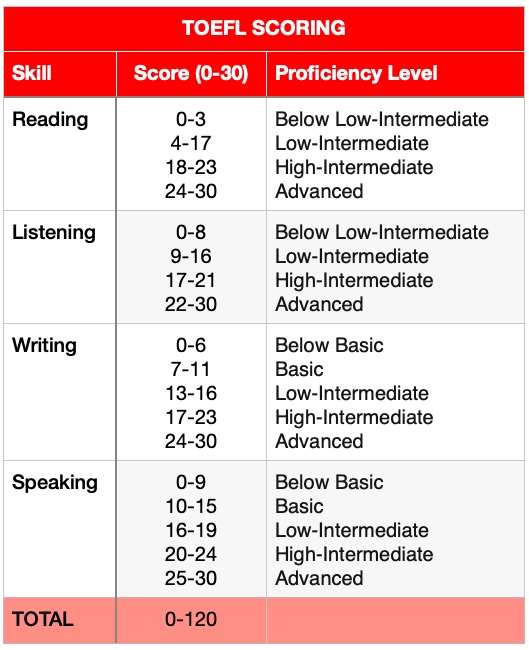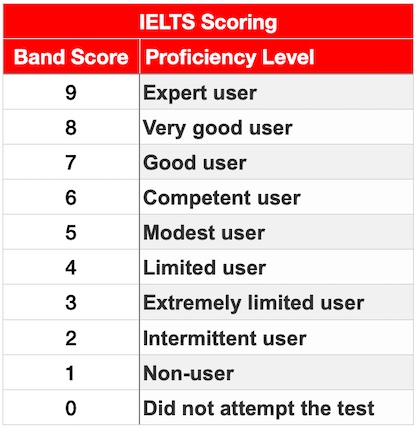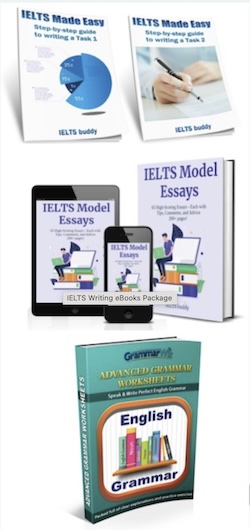- Home
- IELTS Information
- Difference Between Ielts and Toefl
Difference Between IELTS and TOEFL
Here we'll discuss the main differences between IELTS and TOEFL in case you are unsure of which test to take.
Both IELTS and TOEFL are exams that prove your English language skills. They are two of the most popular and widely used tests for doing this.
Both have a high degree of credibility and recognition by institutions that wish to assess a person's English. Both of them test reading, writing, speaking and listening skills.
- TOEFL stands for Test of English as a Foreign Language and it is an English language proficiency exam produced by the US-based ETS (Education Test Service).
- IELTS stands for the International English Language Testing System. It is an exam owned and managed by IDP Australia, The British Council, and Cambridge Examinations.
So what is the difference between IELTS and TOEFL and which one should you take if you want to demonstrate your English ability?
Which countries are they for?
TOEFL
TOEFL specifically sets out to test English communication ability for academic settings such as in classrooms and university.
The test tends to be more related to the USA and is more favoured by American institutions, such as schools and grad school. However, most countries and universities accept the test, including the UK and Australia.
It's important to note though that although TOEFL is accepted in UK university admissions applications, it is no longer accepted in applications for UK student visas due to incidences of fraud several year ago.
On this basis, UK immigration decline to accept it for this purpose. So if you wish to go to the UK, the best choice would really be to take the IELTS test.
IELTS
A difference between IELTS and TOEFL is that while TOEFL is testing for academic settings, IELTS has two parts - an Academic Module that tests for academic settings, and the General Training Module, which is for work settings and general immigration purposes.
So the test mainly helps those wishing to work, study or migrate to native English speaking countries, such as UK, Australia, Canada, New Zealand, and USA. It is recognised though globally by over 10,000 employers, universities, schools and immigration bodies in a multitude of countries.
Scoring
TOEFL
Final total TOEFL scores fall between 0-120, with a score range of 0–30 for each skill of reading, listening, writing, and speaking.
ETC break that score down into the following proficiency levels so that institutions can assess a test taker's skill.
IELTS
The scoring is another difference between IELTS and TOEFL, as rather than being a points system, it is based on band scores, ranging from 0-9.
The reading and listening tests are scored from 0-40, but these scores are then converted to band scores. Writing and speaking are based on a set of marking criteria which are assessed by an examiner, who then awards a band score.
So a candidate ends up with a band score for each skill (reading, writing, listening and speaking), and these are then averaged to give one final band score. Half scores (e.g. 6.5) are also possible.
This is how the scores roughly translate to proficiency:
You can learn more about IELTS band scores here.
Test Formats
TOEFL
TOEFL can be taken as either a Paper-Based Test (TOEFL pBT) or an Internet-Based Test (TOEFL iBT). However, TOEFL iBT is by far the most popular.
Note though that the speaking module can't be taken on the paper-based test. Because of this TOEFL pBT is a slightly shorter test than the iBT. Also, there may be one less reading passage. for the reading section, and one less lecture and conversation for the listening section.
You will see from the outline below, that some parts of the test are integrated, which means it combines a mix of skills in one part, such as basing your writing on a text you have read.
The following is based on TOEFL iBT.
TOEFL iBT Test Format (3hrs)
Reading
3–4 passages of academic type texts
- 700 words each
- approximately 20 minutes on each
- multiple-choice type questions
- 10 questions for each passage
Total: 54–72 minutes
Listening
3–4 lectures
- 3–5 minutes per lecture
- 6 questions on each
2–3 conversations
- 3 minutes per conversation
- 5 questions on each
Total: 41–57 minutes
Writing (2 tasks)
Integrated task
- written response to a short reading and listening
- 20 minutes duration
Independent task
- Written response (essay) to support an opinion on a topic
- 30 minutes duration
Total: 50 minutes
Speaking (2 tasks)
Independent task (x1)
- give an opinion on an everyday topic
- spoken into a microphone
Integrated task (x3)
- do a short reading and listening
- give an opinion on this
- up to a minute to respond
- spoken into a microphone
Total: 17 minutes
IELTS
Like TOEFL, IELTS is paper-based or computer-based, depending on what you prefer and whether a centre has both options.
A clear difference between IELTS and TOEFL however is that no modules in IELTS involve integrating skills. For example, the speaking is not based on a reading, but is just based on questions asked by an examiner. So each skill is assessed independently.
Also, while no part of the TOEFL test includes human contact, in the IELTS test the speaking is undertaken with an examiner who asks the questions. This happens even if you opt to have the computer based test (the speaking test will take place before/later).
Another key difference between IELTS and TOEFL is that IELTS has two tests.
- Academic: For those wishing to attend an educational institution
- General Training: For those wanting to work or migrate to another country
These both test the 4 skills, and the speaking and listening are the same. However, the writing and reading vary. The details are set out below.
IELTS Test Format (3hrs)
Reading
Academic Test:
- 3 academic style readings
- 700-800 words each
- a mix of question types (e.g. multiple-choice; gaps fills; short answer)
- 40 question in total
Total: 60 minutes
General Training:
- 3 non-academic style readings (adverts; manuals; magazine articles etc)
- varying word length
- a mix of question types (e.g. multiple-choice; gaps fills; short answer)
- 40 question in total
Total: 60 minutes
Listening
- 4 sections
- 40 questions
- Sections 1-3: conversations
- Section 4: a lecture/talk
- topics based on social, work, and educational settings
- a mix of question types (e.g. multiple-choice; gaps fills; short answer)
Total: 40 minutes
Writing (2 tasks)
Academic:
Task 1
- Describe a graph, chart, table, diagram, process or map
- 20 minutes
- At least 150 words
Task 2
- Write an academic essay on a given topic
- 40 minutes
- At least 250 words
Total: 60 minutes
General Training:
Task 1
- Write a letter based on a prompt
- Can be formal, semi-formal or informal letter
- 20 minutes
- At least 150 words
Task 2
- Write an academic essay on a given topic
- 40 minutes
- At least 250 words
Total: 60 minutes
Speaking
Interview with an examiner
- 3 parts
- part 1: questions on familiar topics (e.g. work; hobbies)
- part 2: talk for 2 minutes on a given topic
- part 3: discussion with examiner on more complex topics
Total: 11-14 minutes
A difference between IELTS and TOEFL is also in the accents you hear in the test. In IELTS you can get a mix of accents, while in TOEFL they will be North American accents only.
Key difference between IELTS and TOEFL
So let's summarise some of the main difference between IELTS and TOEFL with some key questions that may help you to decide what is your preference.
Where do you want to go?
- TOEFL is more geared towards entry to US educational establishments (it can't be used for a UK visa)
- IELTS is more for work, immigration or study in UK, Canada, Australia, and New Zealand
What type of test format do you prefer?
- TOEFL has some integrated elements in its test, with combined listening, reading, speaking and writing activities
- Each skill is tested separately in IELTS
Do you like multiple choice type questions?
- TOEFL has mostly multiple-choice types questions in its reading and listening
- IELTS has a greater mix of question types, with the candidate often having to write in answers
Is reading your strong point?
- TOEFL reading uses only high-level academic texts
- IELTS is still high-level but has a mix of journal and magazine type articles. Also the General Training readings are easier.
Do your prefer writing by hand or computer?
- TOEFL is nearly always computer-based
- IELTS is now much more computer-based, but there is usually the choice to do a paper-based test if you prefer that
Do you want the test for general migration or work?
- TOEFL is mainly for educational and academic purposes
- IELTS has the General Training test, which tends to be slightly easier in its writing task 1 (a letter) and its readings (text based on adverts; instructions etc)
Do you like speaking to a real person or does this make you nervous?
- TOEFL speaking is speaking into a microphone, with your speaking assessed later
- IELTS speaking is taken with an examiner who'll ask you questions and listen to you speaking
Where can you travel to take the test?
- You might prefer one test over another simply because it has a location much nearer to you.
Is cost a factor?
- There is no real difference between IELTS and TOEFL in price as they cost around the same amount to take, but it can vary a bit from country to country, so it's worth checking this.
If you are simply wondering which test might be easier for you, check out our summary on is TOEFL or IELTS easier?
Comments
Any comments or questions about this page or about IELTS? Post them here. Your email will not be published or shared.





























